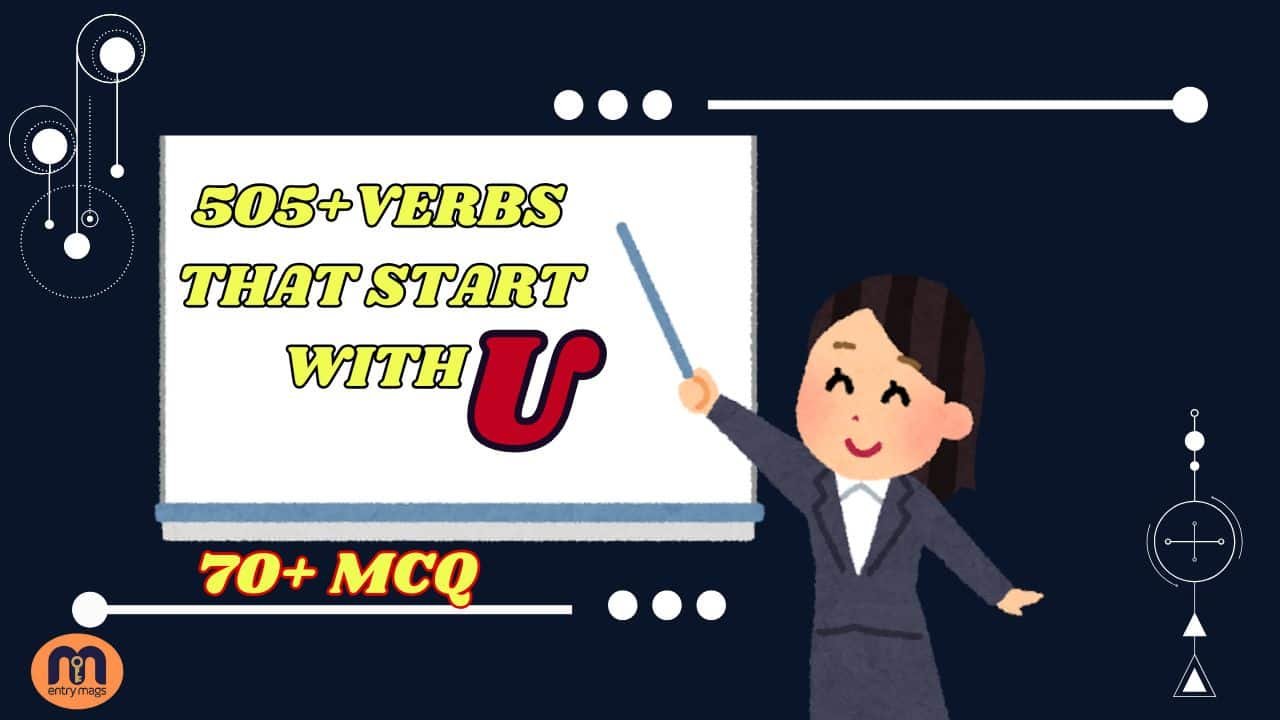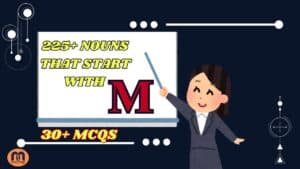Verbs That Start With U: Have you ever wondered how many verbs in the English language start with the letter “U”?
If you’re a language enthusiast, a student, or even someone working on improving their vocabulary, you’ll be fascinated by the sheer number of dynamic verbs that can enrich your language.
From everyday conversations to more formal discussions, the power of verbs cannot be overstated they add action, energy, and clarity to your words.
So, let’s take a deep dive into the world of verbs starting with “U” and explore how they can elevate your language skills.
Why Focus on Verbs That Start With “U”?
The letter “U” may not seem like the most popular starting point for verbs, but you’d be surprised at how versatile and useful “U-verbs” are in both written and spoken English.
Whether you’re writing an essay, crafting a professional email, or even just chatting with a friend, having a strong grasp of “U” verbs can make your language both engaging and precise.
In this article, we’ll not only list over 505+ verbs that start with “U,” but we will also explain their meanings, provide examples, and discuss how they can be used effectively in your communication.
Ready to explore the vast possibilities?
Commonly Used Verbs That Start With “U”
Let’s start with a selection of the most commonly used “U” verbs. These verbs are fundamental to both casual conversations and more formal writing. By incorporating them into your language, you can easily add variety to your vocabulary.
- Use
- Understand
- Uphold
- Uncover
- Upgrade
- Utilize
- Unite
- Undermine
- Urge
- Unveil
Examples:
- Use: “She used the new software to complete her project.”
- Understand: “I understand the complexity of the situation.”
- Uphold: “We must uphold the values of fairness and integrity.”
- Uncover: “The detective worked tirelessly to uncover the truth.”
These are verbs that pop up frequently in daily speech and writing. Understanding their nuances will help you express yourself more effectively.
Action-Oriented U-Verbs: Powering Up Your Language
Some “U” verbs are action-driven and can make your language more dynamic. These verbs often convey strong actions or behaviors that can transform your statements from passive to active, making your speech or writing more compelling.
- Unleash
- Undertake
- Unlock
- Upset
- Utter
- Uproot
- Unplug
- Unfold
- Uphold
- Upend
Examples:
- Unleash: “The artist unleashed her creativity in the final piece.”
- Undertake: “He will undertake the responsibility of managing the team.”
- Unlock: “The new discovery could unlock many possibilities for future research.”
- Upset: “The news of his resignation upset the entire team.”
These verbs add movement and momentum to your communication, helping you move past static or dull expressions and bringing energy into your narrative.
Verbs for Thought and Reflection
In addition to action-driven verbs, there are those that allow us to explore deeper meanings, thoughts, and emotions. These verbs, starting with “U,” can enrich your writing and help convey complex or reflective ideas.
- Understand
- Uphold
- Unravel
- Undermine
- Usher
- Unearth
- Unwind
- Utilize
- Undergo
- Unfold
Examples:
- Understand: “To understand the problem, we must first analyze the data.”
- Unravel: “The team worked tirelessly to unravel the mystery.”
- Unearth: “Archaeologists unearthed ancient artifacts during the excavation.”
- Undergo: “The company is undergoing a major transformation.”
These verbs encourage a more thoughtful or reflective tone, making them useful when writing analytical essays, reports, or even philosophical musings.
Unique and Uncommon U-Verbs
Now, let’s explore some lesser-known yet equally useful “U” verbs. These verbs may not always be as widely used, but incorporating them into your vocabulary can make your language more sophisticated and diverse.
- Usher
- Unclog
- Unravel
- Undulate
- Upend
- Underestimate
- Unfurl
- Unwind
- Unleash
- Upstage
Examples:
- Usher: “The guide ushered the visitors into the exhibition hall.”
- Unclog: “She had to unclog the sink after the drainage issue.”
- Undulate: “The waves undulated gently as the boat sailed across the sea.”
- Upstage: “Don’t let anyone upstage you during the performance.”
These unique verbs can add a touch of elegance or specificity, depending on the context in which they’re used.
Unlocking the Power of “U”: Verbs to Elevate Your Language
Verbs that start with “U” can make your communication more vibrant and dynamic. These verbs are essential in storytelling, argumentation, and everyday conversation. They add action, clarity, and emphasis to your language, allowing you to express yourself with confidence.
- Uncover
- Undertake
- Unleash
- Unveil
- Uphold
- Use
- Unwind
- Unravel
- Undermine
- Upend
- Urge
- Utilize
- Unplug
- Unfold
- Unclog
- Unbox
- Usher
- Unmask
- Underestimate
- Unhinge
- Unfurl
- Upstage
- Undulate
- Unleash
- Unbutton
- Untangle
- Unlace
- Uproot
- Unbind
- Unpop
- Unfreeze
- Unblock
- Unjoin
- Unzip
- Uncoil
- Unfix
- Unfold
- Unbrace
- Unwind
- Unfurl
Example:
- Unlock: “Her discovery could unlock new possibilities in science.”
Unique Verbs to Make Your Writing Shine
Incorporating unique “U-verbs” can give your writing a distinctive flair. These verbs aren’t just for show they can make your descriptions more vivid and your ideas more impactful. They are particularly effective when you want to stand out or highlight something important.
- Unveil
- Unravel
- Unplug
- Unhook
- Unbind
- Untangle
- Undermine
- Undulate
- Uncover
- Unfreeze
- Unzip
- Uncoil
- Unmask
- Unfold
- Unbox
- Uproot
- Upend
- Unfurl
- Upstage
- Unbutton
- Unlatch
- Unblock
- Undergird
- Unbend
- Uncage
- Untwist
- Unfreeze
- Unshackle
- Unbrace
- Unroll
- Unbutton
- Unshroud
- Unbind
- Unstick
- Unfold
- Unseam
- Unloosen
- Unmix
- Unravel
- Unfurl
Example:
- Unfurl: “The curtains unfurled slowly, revealing the breathtaking view.”
Action-Packed U-Verbs: Transform Your Language
When you want your language to pack a punch, “U-verbs” are your go-to. Action verbs like “upend” and “urge” make your writing dynamic and keep your readers or listeners engaged. These verbs convey movement, energy, and decisiveness.
- Unleash
- Upend
- Urge
- Undertake
- Uncover
- Undermine
- Unravel
- Unmask
- Unplug
- Unveil
- Usher
- Unfurl
- Unhinge
- Unzip
- Uncoil
- Unblock
- Uproot
- Unbind
- Unwrap
- Unbutton
- Unfix
- Unveil
- Unfold
- Unbox
- Untangle
- Unwrap
- Unstick
- Unbrace
- Uncage
- Unbolt
- Unseal
- Unfreeze
- Unmask
- Unshackle
- Undulate
- Unjoin
- Unlatch
- Unsnag
- Untwist
- Unbind
Example:
- Upend: “The strong wind upended the tree, leaving it on its side.”
Verbs for Deep Thought and Reflection
Some “U-verbs” are perfect for thoughtful reflection or analysis. These verbs allow you to express complex ideas or analyze intricate situations. Whether you’re discussing philosophical concepts or unraveling a complex issue, these verbs will enrich your dialogue.
- Understand
- Unravel
- Unearth
- Undermine
- Unveil
- Unplug
- Unfold
- Unmask
- Unwind
- Uncover
- Undergo
- Unfreeze
- Unbox
- Unclog
- Unwrap
- Upend
- Undulate
- Uplift
- Untangle
- Unbind
- Unveil
- Unhook
- Unclog
- Unfurl
- Unravel
- Unbutton
- Unmask
- Unlatch
- Unblock
- Unseam
- Unbend
- Unfasten
- Unwind
- Uncoil
- Unstick
- Unshackle
- Unfreeze
- Unbind
- Unshroud
- Unblock
Example:
- Understand: “I finally understood the importance of teamwork after the project was completed.”
Utilizing U-Verbs for Everyday Conversations
Incorporating “U-verbs” into daily conversations will instantly make your speech more interesting and expressive. These verbs can add clarity or color, helping you communicate with more precision and engagement in everyday exchanges.
- Use
- Urge
- Unify
- Unwind
- Unfold
- Understand
- Unclog
- Uncover
- Unleash
- Unveil
- Unbox
- Undertake
- Unhook
- Unfasten
- Unmask
- Upend
- Unwrap
- Unzip
- Unlatch
- Unplug
- Uplift
- Unwind
- Unbrace
- Unbind
- Unravel
- Unbutton
- Uncoil
- Untangle
- Unblock
- Unseam
- Unfix
- Unshackle
- Unravel
- Unseal
- Unwrap
- Unblock
- Unfold
- Untwist
- Unbind
- Unveil
Example:
- Use: “I always use a notebook to jot down my ideas.”
Verbs for Changing the Game: Unveil New Ideas
Verbs like “unveil” and “unlock” are great for presenting fresh ideas or revealing new concepts. These verbs show a sense of discovery or revelation, perfect for introducing new perspectives or offering insights that could change the status quo.
- Unveil
- Uncover
- Unlock
- Undermine
- Unmask
- Unravel
- Undulate
- Unfold
- Unbox
- Uproot
- Unplug
- Unfreeze
- Unshackle
- Untangle
- Unveil
- Unblock
- Unzip
- Uncoil
- Unbind
- Unseal
- Unbutton
- Unhook
- Unclog
- Unfurl
- Unshroud
- Unbind
- Unravel
- Unfix
- Unfasten
- Unmask
- Unlatch
- Unblock
- Unwind
- Unwrap
- Unstick
- Unfreeze
- Untwist
- Unwind
- Unbrace
- Unshackle
Example:
- Unveil: “The company will unveil its new product at the conference tomorrow.”
Crafting Powerful Statements with U-Verbs
Want to make your language bold and assertive? “U-verbs” like “undermine” or “unleash” can help you craft statements that leave an impact. These verbs are great for conveying strong opinions or making decisive calls to action.
- Undermine
- Unleash
- Unveil
- Unmask
- Unplug
- Unravel
- Unfurl
- Upend
- Urge
- Uncover
- Unbox
- Unblock
- Uproot
- Uncoil
- Unbind
- Unfasten
- Unwrap
- Untangle
- Unwind
- Unbutton
- Unclog
- Unstick
- Unfreeze
- Unveil
- Unhook
- Unravel
- Unfix
- Unhook
- Unbind
- Unblock
- Unseam
- Unfurl
- Unfasten
- Unfreeze
- Unbutton
- Unplug
- Unmask
- Unwrap
- Unstick
- Unbind
Example:
- Undermine: “His constant criticism began to undermine her confidence.”
Verbs for Complex Situations and Challenges
Verbs that allow you to explain intricate problems or solutions can be invaluable when addressing challenges. “U-verbs” like “unravel” or “undergo” are useful for complex scenarios where there are multiple layers to consider.
- Unravel
- Understand
- Unfold
- Undermine
- Unveil
- Unbox
- Unclog
- Unmask
- Unwind
- Undertake
- Unhook
- Unfreeze
- Unbind
- Unfasten
- Unravel
- Uncover
- Untangle
- Unblock
- Unveil
- Unbox
- Unseam
- Unshackle
- Unclip
- Unfurl
- Undulate
- Unhinge
- Unbuckle
- Unwrap
- Unplug
- Unstick
- Unshroud
- Unfreeze
- Unroll
- Uncoil
- Unbutton
- Unbolt
- Unclip
- Unfix
- Unbind
- Unhook
Example:
- Unravel: “The team worked tirelessly to unravel the mystery.”
Bring Freshness to Your Writing with Uncommon U-Verbs
Incorporating rare “U-verbs” into your writing is an excellent way to avoid repetition and add originality. These verbs offer a refreshing change, making your text more engaging and sophisticated.
- Unclog
- Unravel
- Unseal
- Unveil
- Unlatch
- Unbind
- Uncoil
- Unshackle
- Unblock
- Unbutton
- Unfasten
- Unfreeze
- Unwrap
- Unshroud
- Unfold
- Unhook
- Unfold
- Unbind
- Unfasten
- Untangle
- Unlatch
- Uncover
- Unmask
- Unstick
- Unzip
- Unbind
- Unfreeze
- Unshackle
- Uncoil
- Unravel
- Unfold
- Unfurl
- Unwrap
- Unbutton
- Unblock
- Unshroud
- Unmask
- Unfasten
- Untwist
- Unplug
Example:
- Unclog: “She had to unclog the sink after the drainage issue.”
Verbs That Connect and Unite: Strengthening Relationships
Whether you’re working in a team or interacting with others, verbs like “unite” and “urge” create connections that encourage collaboration and solidarity. These verbs can be particularly useful in leadership or teamwork contexts.
- Unite
- Urge
- Unify
- Unveil
- Understand
- Unfold
- Unmask
- Unravel
- Undermine
- Unplug
- Unleash
- Unbind
- Uplift
- Unfasten
- Unblock
- Unveil
- Unlatch
- Uncoil
- Unravel
- Unclog
- Unwrap
- Unbutton
- Untangle
- Unhook
- Undulate
- Unfreeze
- Unseal
- Unbind
- Unshackle
- Unwrap
- Unblock
- Unbutton
- Unshroud
- Unfix
- Untwist
- Unbind
- Unmask
- Uncoil
- Unplug
- Unravel
Example:
- Unite: “The team united to overcome the obstacles and finish the project on time.”
Helpful Tips for Using U-Verbs Effectively
To maximize the impact of “U-verbs” in your writing and speech, consider the following tips:
- Be Clear on the Meaning: Some verbs, like “upend” and “unleash,” may have strong connotations, so make sure you use them in the appropriate context to avoid misunderstandings.
- Mix with Other Verb Types: To avoid repetition, blend “U-verbs” with verbs starting with other letters. This creates more varied and lively language.
- Practice in Context: It’s helpful to practice using “U-verbs” in sentences. Write short stories or essays that incorporate these verbs to build comfort.
- Expand Gradually: Start with commonly used “U-verbs” and work your way toward the less familiar ones. Gradual exposure ensures you don’t overwhelm yourself while still expanding your vocabulary.
Conclusion: The Power of U-Verbs in Mastering English
Incorporating verbs that start with “U” into your vocabulary is a powerful way to enhance your communication skills.
Whether you’re aiming for clarity, action, reflection, or even a more sophisticated tone, “U-verbs” can serve as essential tools in achieving your language goals.
So, why not challenge yourself to learn and use at least one new “U-verb” each week? Whether you’re writing, speaking, or simply learning, the variety and dynamism of these verbs will help make your language richer and more engaging.
What “U-verb” will you use in your next conversation or piece of writing?
Let’s keep the exploration going your language journey is just beginning! [Verbs That Start With U]
MCQs: Verbs That Start with “U”
1. Which verb from the list means to “reveal” or “make known”?
a) Unravel
b) Unveil
c) Unblock
d) Unbind
Answer: b) Unveil
2. Which of the following verbs means to “expose something hidden or secret”?
a) Unravel
b) Unmask
c) Unfreeze
d) Untangle
Answer: b) Unmask
3. Which of these verbs means to “remove an obstruction”?
a) Unplug
b) Unbind
c) Unfreeze
d) Unfold
Answer: a) Unplug
4. Which verb is used when describing the action of “untangle or separate”?
a) Unfold
b) Unwind
c) Unshackle
d) Uncoil
Answer: b) Unwind
5. Which verb means to “increase the energy or power of something”?
a) Unleash
b) Undermine
c) Unzip
d) Unfreeze
Answer: a) Unleash
6. The verb “to urge” means:
a) To pull apart
b) To persuade or encourage strongly
c) To fold
d) To reverse
Answer: b) To persuade or encourage strongly
7. Which of these verbs would you use to describe “revealing a new product”?
a) Unbox
b) Unplug
c) Uncoil
d) Unbind
Answer: a) Unbox
8. Which verb would be best used to describe “a situation where you are no longer able to continue without help”?
a) Unlatch
b) Unravel
c) Unblock
d) Unfasten
Answer: b) Unravel
9. Which of the following verbs means “to release or set free”?
a) Unclog
b) Unbind
c) Unfold
d) Unzip
Answer: b) Unbind
10. Which verb is best used to describe “unlocking a door”?
a) Unveil
b) Unbind
c) Unfasten
d) Unlock
Answer: d) Unlock
11. What does the verb “upend” mean?
a) To push forward
b) To turn upside down
c) To change dramatically
d) To separate
Answer: b) To turn upside down
12. Which verb means to “make something clear or to unravel”?
a) Unfold
b) Unravel
c) Unplug
d) Unfreeze
Answer: b) Unravel
13. Which of these verbs is most suitable for describing “taking back or reversing”?
a) Undermine
b) Unbind
c) Unmask
d) Undo
Answer: d) Undo
14. Which verb means “to fix something or prevent it from falling apart”?
a) Unblock
b) Unfasten
c) Undulate
d) Undergird
Answer: d) Undergird
15. The verb “to untangle” can also mean:
a) To clear up confusion
b) To compress
c) To block
d) To fall apart
Answer: a) To clear up confusion
16. If you “unzip” something, you are likely doing which action?
a) Closing it
b) Tightening it
c) Opening it
d) Moving it
Answer: c) Opening it
17. The verb “undulate” means:
a) To rise and fall in a wave-like pattern
b) To disrupt
c) To confuse
d) To repair
Answer: a) To rise and fall in a wave-like pattern
18. Which of these verbs describes “to unfold or gradually open”?
a) Unclog
b) Unfurl
c) Unbind
d) Unhook
Answer: b) Unfurl
19. Which verb means “to reduce or minimize the effect of something”?
a) Undermine
b) Unwrap
c) Unveil
d) Untangle
Answer: a) Undermine
20. Which of the following verbs would describe the action of “unlocking a door”?
a) Unveil
b) Unbind
c) Unfasten
d) Unlock
Answer: d) Unlock
21. Which verb means “to slow or reverse the flow of water”?
a) Unblock
b) Unfreeze
c) Unwind
d) Unclog
Answer: d) Unclog
22. Which verb best describes “a sudden change in direction or posture”?
a) Upstage
b) Upend
c) Unmask
d) Unzip
Answer: b) Upend
23. The verb “uncoil” refers to:
a) To untangle
b) To unravel a thread or rope
c) To twist or turn
d) To assemble
Answer: b) To unravel a thread or rope
24. Which of the following verbs means “to release from a restraint or limitation”?
a) Unblock
b) Unfreeze
c) Unleash
d) Unravel
Answer: c) Unleash
25. The verb “unite” means:
a) To separate
b) To join together
c) To divide
d) To criticize
Answer: b) To join together
26. The verb “undulate” could be used to describe:
a) The movement of waves on the ocean
b) The action of fixing something
c) The removal of an obstacle
d) The increase of speed
Answer: a) The movement of waves on the ocean
27. Which verb would you use to describe “stopping something from continuing”?
a) Unwrap
b) Unplug
c) Unfold
d) Unravel
Answer: b) Unplug
28. The verb “unbutton” refers to:
a) To open a button
b) To close something
c) To detach
d) To arrange
Answer: a) To open a button
29. Which of these verbs would best describe “to disassemble something piece by piece”?
a) Unbind
b) Untangle
c) Unfasten
d) Unravel
Answer: d) Unravel
30. Which of these verbs means “to release from chains or limitations”?
a) Unmask
b) Unshackle
c) Untwist
d) Unwrap
Answer: b) Unshackle
31. Which verb would be used to describe “to complete a task or action”?
a) Undertake
b) Unveil
c) Unblock
d) Unbind
Answer: a) Undertake
32. Which verb describes “to separate something into smaller parts”?
a) Unravel
b) Unplug
c) Unbind
d) Unbox
Answer: a) Unravel
33. Which of these verbs means “to bring together or unite”?
a) Unwind
b) Unite
c) Unbind
d) Unveil
Answer: b) Unite
34. The verb “unshackle” means:
a) To release from chains or restraints
b) To remove obstacles
c) To untwist
d) To unravel
Answer: a) To release from chains or restraints
35. “Upstage” refers to:
a) To hide something
b) To take attention away from someone
c) To create a mess
d) To move forward
Answer: b) To take attention away from someone
36. Which verb is used when you “arrange or organize something” neatly?
a) Unravel
b) Unzip
c) Unfold
d) Uncoil
Answer: c) Unfold
37. Which verb best fits the definition “to delay or slow the movement of”?
a) Unwrap
b) Unblock
c) Undulate
d) Unfreeze
Answer: d) Unfreeze
38. Which of these verbs means “to start something anew or from the beginning”?
a) Untwist
b) Unveil
c) Uncoil
d) Unfreeze
Answer: a) Untwist
39. The verb “uncoil” refers to:
a) To twist into shape
b) To loosen something that is wound
c) To button something up
d) To unblock
Answer: b) To loosen something that is wound
40. Which verb describes the action of “revealing or displaying something”?
a) Unfasten
b) Unwrap
c) Unblock
d) Unmask
Answer: b) Unwrap
41. Which verb means “to reduce the strength or effectiveness of something”?
a) Unleash
b) Undermine
c) Unplug
d) Unbind
Answer: b) Undermine
42. The verb “unplug” refers to:
a) To stop or disconnect a power source
b) To reattach something
c) To untangle wires
d) To open a container
Answer: a) To stop or disconnect a power source
43. Which verb means “to remove a covering from something”?
a) Unwrap
b) Unfold
c) Uncoil
d) Unblock
Answer: a) Unwrap
44. Which of these verbs means “to pull something out of a container”?
a) Unbind
b) Unveil
c) Unzip
d) Unclog
Answer: c) Unzip
45. Which verb means “to deal with or face a challenge”?
a) Unwind
b) Undertake
c) Unleash
d) Unfold
Answer: b) Undertake
46. Which verb is used to describe the action of “untangling a knot”?
a) Uncoil
b) Unwind
c) Unravel
d) Unfreeze
Answer: b) Unwind
47. Which of these verbs means “to open something for the first time”?
a) Unbind
b) Unwrap
c) Unblock
d) Unravel
Answer: b) Unwrap
48. The verb “undo” means to:
a) To make something better
b) To reverse or cancel something
c) To continue forward
d) To remove an obstacle
Answer: b) To reverse or cancel something
49. Which of these verbs describes “to remove fasteners or secure items”?
a) Unbutton
b) Unbind
c) Unravel
d) Unzip
Answer: a) Unbutton
50. Which verb refers to “to remove something from a container or place”?
a) Unveil
b) Unclog
c) Unbox
d) Unmask
Answer: c) Unbox
51. Which verb means “to clarify or simplify something”?
a) Unplug
b) Unravel
c) Unfold
d) Unmask
Answer: b) Unravel
52. The verb “unmask” is used to:
a) Reveal someone’s identity
b) Take off a piece of clothing
c) Create an obstacle
d) Seal something
Answer: a) Reveal someone’s identity
53. Which verb refers to “to reveal the truth or expose a lie”?
a) Unveil
b) Unmask
c) Unwind
d) Unplug
Answer: b) Unmask
54. The verb “uncoil” means:
a) To wrap something tightly
b) To untangle or loosen something wound up
c) To connect things together
d) To cover something
Answer: b) To untangle or loosen something wound up
55. Which verb means “to stop or prevent something from continuing”?
a) Unbind
b) Unplug
c) Unblock
d) Unfold
Answer: b) Unplug
56. Which verb means “to change the direction of something suddenly”?
a) Unravel
b) Upstage
c) Unleash
d) Unblock
Answer: b) Upstage
57. The verb “undo” can be used to:
a) Repair something
b) Reverse an action
c) Create new obstacles
d) Tie something
Answer: b) Reverse an action
58. Which verb describes “to untwist or make straight”?
a) Uncoil
b) Unbind
c) Unwrap
d) Unwind
Answer: a) Uncoil
59. Which verb means “to remove something from a cover or wrapper”?
a) Unwrap
b) Unravel
c) Unfreeze
d) Unbox
Answer: a) Unwrap
60. The verb “unfreeze” means:
a) To solidify something
b) To reverse a frozen state or bring something back to normal
c) To turn something into ice
d) To untangle something
Answer: b) To reverse a frozen state or bring something back to normal
61. Which verb refers to “to make a blockage clear or remove an obstacle”?
a) Unfreeze
b) Unclog
c) Unzip
d) Unbutton
Answer: b) Unclog
62. The verb “unveil” refers to:
a) To cover something
b) To expose or reveal something
c) To close something tightly
d) To create confusion
Answer: b) To expose or reveal something
63. Which verb means “to release energy or force”?
a) Unravel
b) Unbind
c) Unleash
d) Unplug
Answer: c) Unleash
64. Which of these verbs describes “to open something that has been sealed”?
a) Unzip
b) Unblock
c) Unfasten
d) Unfold
Answer: a) Unzip
65. Which verb describes the action of “exposing someone’s identity”?
a) Unravel
b) Unplug
c) Unmask
d) Unbind
Answer: c) Unmask
66. The verb “unfasten” refers to:
a) To close something
b) To open or loosen something that is fastened
c) To attach
d) To block something
Answer: b) To open or loosen something that is fastened
67. The verb “upend” refers to:
a) To make something fall apart
b) To place something upside down
c) To undo an action
d) To organize
Answer: b) To place something upside down
68. Which verb is used when you “clear a blocked path or pipe”?
a) Unclog
b) Uncoil
c) Unfreeze
d) Unwind
Answer: a) Unclog
69. Which verb would you use to describe “to remove the cover of something”?
a) Unwrap
b) Unfold
c) Unravel
d) Uncoil
Answer: a) Unwrap
70. The verb “unwind” is used when describing:
a) Unfolding a document
b) Relaxing after a busy day
c) Tightening something
d) Tying a knot
Answer: b) Relaxing after a busy day
Read more knowledgeable blogs on Entry Mags









